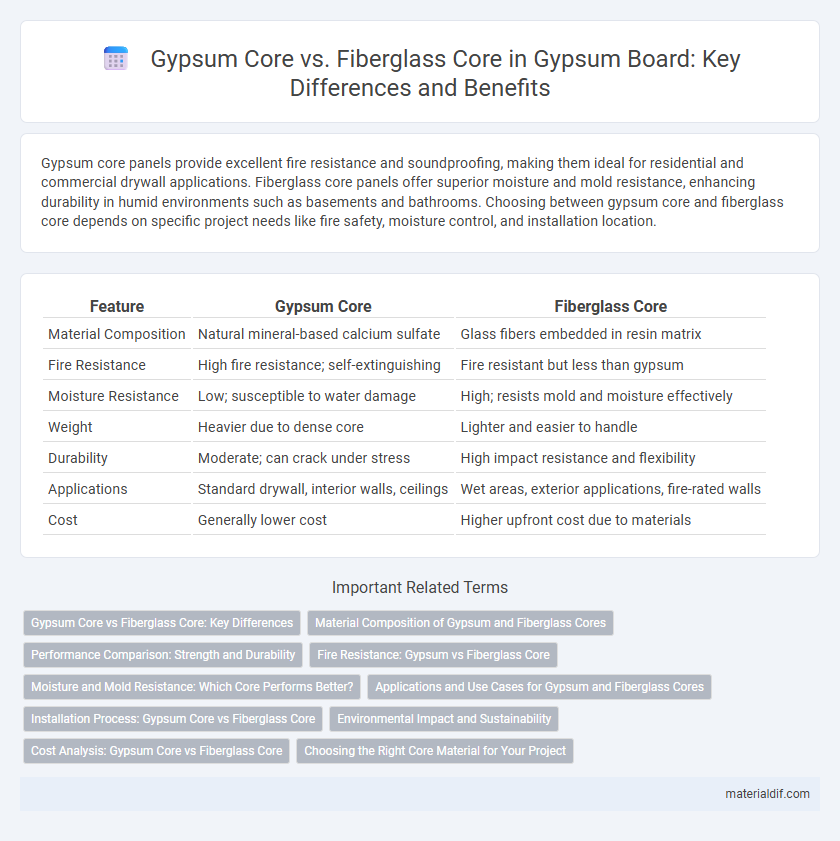Gypsum core panels provide excellent fire resistance and soundproofing, making them ideal for residential and commercial drywall applications. Fiberglass core panels offer superior moisture and mold resistance, enhancing durability in humid environments such as basements and bathrooms. Choosing between gypsum core and fiberglass core depends on specific project needs like fire safety, moisture control, and installation location.
Table of Comparison
| Feature | Gypsum Core | Fiberglass Core |
|---|---|---|
| Material Composition | Natural mineral-based calcium sulfate | Glass fibers embedded in resin matrix |
| Fire Resistance | High fire resistance; self-extinguishing | Fire resistant but less than gypsum |
| Moisture Resistance | Low; susceptible to water damage | High; resists mold and moisture effectively |
| Weight | Heavier due to dense core | Lighter and easier to handle |
| Durability | Moderate; can crack under stress | High impact resistance and flexibility |
| Applications | Standard drywall, interior walls, ceilings | Wet areas, exterior applications, fire-rated walls |
| Cost | Generally lower cost | Higher upfront cost due to materials |
Gypsum Core vs Fiberglass Core: Key Differences
Gypsum core drywall offers superior fire resistance and soundproofing qualities compared to fiberglass core panels, which are lighter and more moisture-resistant. The dense composition of gypsum core makes it ideal for interior walls requiring durability and strong thermal insulation, while fiberglass core sheets excel in damp environments due to their mold and mildew resistance. Choosing between gypsum core and fiberglass core largely depends on the specific application needs such as fire safety standards versus moisture control.
Material Composition of Gypsum and Fiberglass Cores
Gypsum cores consist primarily of calcium sulfate dihydrate, providing excellent fire resistance and soundproofing due to their dense, crystalline structure. Fiberglass cores are made from interwoven glass fibers embedded in resin, offering superior moisture resistance and enhanced tensile strength compared to gypsum. The material composition differences affect their respective durability, weight, and suitability for various construction applications.
Performance Comparison: Strength and Durability
Gypsum core drywall offers excellent fire resistance and soundproofing but is more susceptible to water damage and lower impact strength compared to fiberglass core drywall. Fiberglass core drywall provides superior moisture resistance, higher impact durability, and better structural integrity in humid or high-traffic environments. These performance differences make fiberglass core drywall ideal for areas prone to moisture and physical wear, while gypsum core remains favorable for standard interior applications with moderate conditions.
Fire Resistance: Gypsum vs Fiberglass Core
Gypsum core drywall offers superior fire resistance due to its chemically bound water content, which releases steam when exposed to heat, slowing fire spread. Fiberglass core panels provide improved thermal insulation and durability but generally have lower fire resistance compared to gypsum cores. Building codes often favor gypsum core materials for fire-rated assemblies because of their proven ability to withstand high temperatures and prevent flame penetration.
Moisture and Mold Resistance: Which Core Performs Better?
Fiberglass core drywall offers superior moisture and mold resistance compared to traditional gypsum core due to its glass fibers that do not absorb water and inhibit mold growth. Gypsum core drywall tends to retain moisture, making it more susceptible to mold in damp conditions. For environments prone to humidity or water exposure, fiberglass core provides enhanced durability and long-term performance.
Applications and Use Cases for Gypsum and Fiberglass Cores
Gypsum core is widely used in interior construction for drywall and ceiling panels due to its fire-resistant, sound-insulating, and moisture-regulating properties, making it ideal for residential and commercial buildings. Fiberglass core panels are preferred in environments requiring enhanced strength and moisture resistance, such as exterior walls, clean rooms, and humid areas, because of their durability and mold-resistant characteristics. Both cores serve critical roles in building design, with gypsum core favored for cost-effective interior finishes and fiberglass core chosen for high-performance situations demanding longevity and structural integrity.
Installation Process: Gypsum Core vs Fiberglass Core
Gypsum core panels offer straightforward installation due to their lightweight nature and ease of cutting with standard tools, reducing labor time on-site. Fiberglass core panels require specialized handling and cutting equipment to avoid damaging the core, which can increase installation complexity and duration. The gypsum core's compatibility with traditional fasteners and joint treatments makes it favorable for faster, more efficient drywall assembly compared to fiberglass core systems.
Environmental Impact and Sustainability
Gypsum core drywall offers superior environmental benefits due to its natural composition and high recyclability, significantly reducing landfill waste compared to fiberglass core materials. Fiberglass cores, while durable, rely on synthetic glass fibers that require energy-intensive production and are less biodegradable, contributing to a larger carbon footprint. Sustainable construction projects increasingly favor gypsum core drywall for its lower embodied energy and ability to be recycled into new gypsum products, promoting circular economy principles.
Cost Analysis: Gypsum Core vs Fiberglass Core
Gypsum core drywall generally offers a lower upfront material cost compared to fiberglass core drywall, making it a preferred choice for budget-sensitive projects. While fiberglass core provides enhanced moisture and fire resistance, its higher price point can increase overall project expenses. Cost analysis should consider long-term durability and maintenance savings, as fiberglass core panels may reduce replacement frequency despite their initial premium.
Choosing the Right Core Material for Your Project
Gypsum core drywall offers superior fire resistance and soundproofing, making it ideal for residential and commercial construction projects that prioritize safety and quiet environments. Fiberglass core boards provide enhanced moisture resistance and durability, suitable for high-humidity areas such as kitchens, bathrooms, and basements where mold prevention is critical. Selecting the right core material depends on the specific environmental conditions and performance requirements of your project.
Gypsum core vs Fiberglass core Infographic

 materialdif.com
materialdif.com